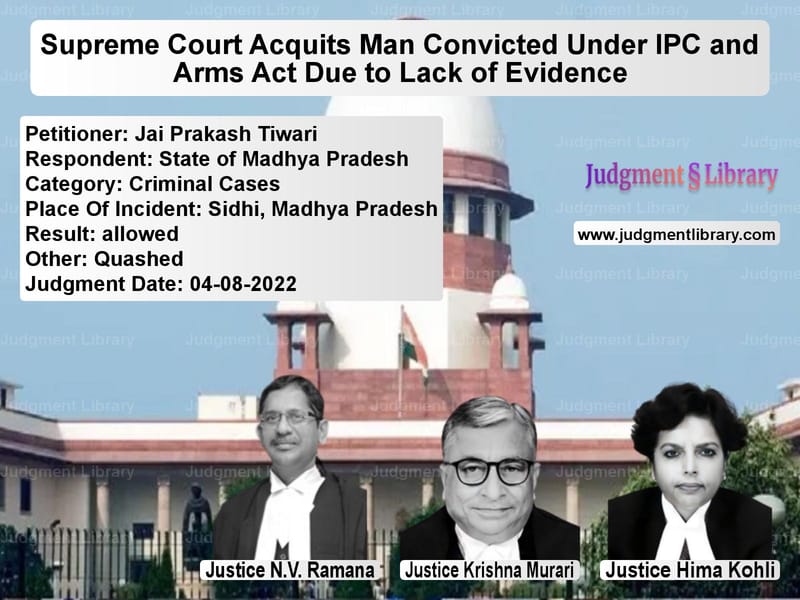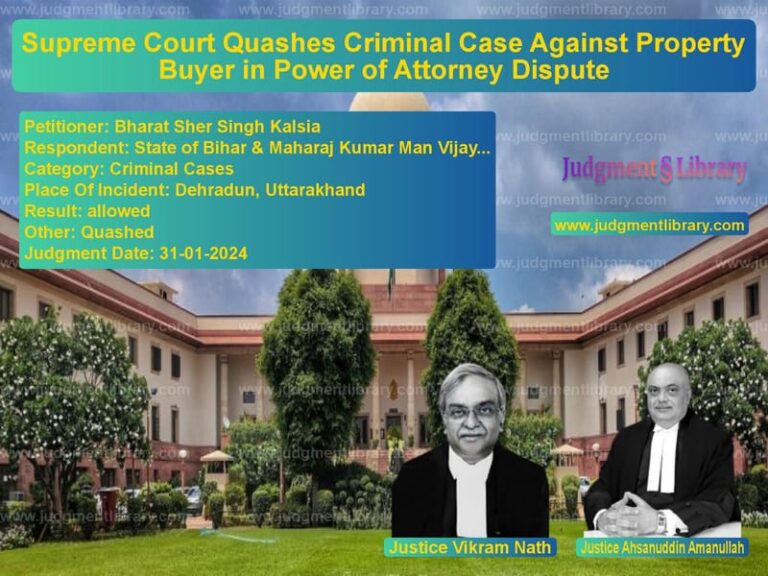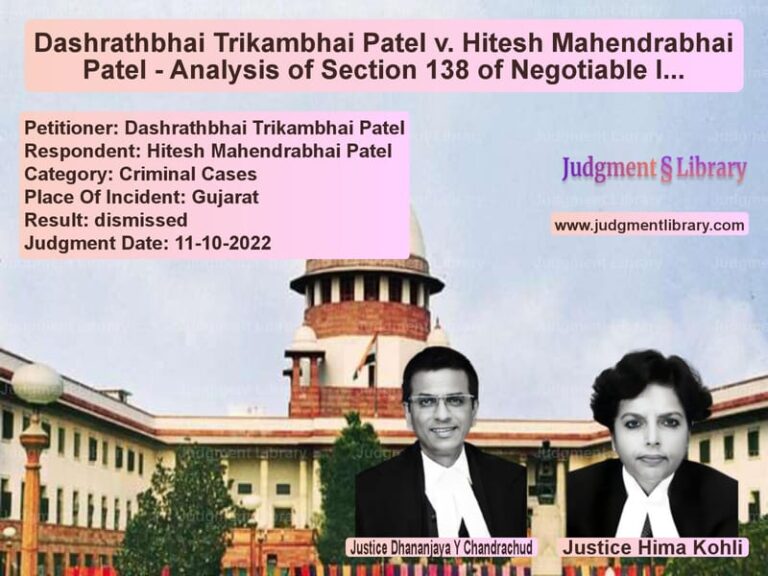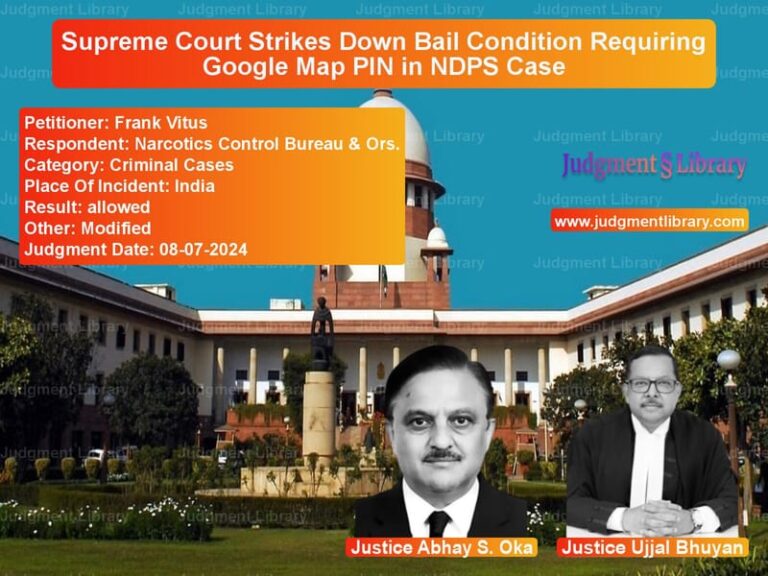Supreme Court Acquits Man Convicted Under IPC and Arms Act Due to Lack of Evidence
The Supreme Court has acquitted Jai Prakash Tiwari, who was convicted under Section 307 of the Indian Penal Code (IPC) for attempted murder and Sections 25 and 27 of the Arms Act for illegal possession and use of a firearm. The Court found that the prosecution failed to establish his guilt beyond a reasonable doubt, highlighting inconsistencies in witness testimonies and procedural lapses in the investigation.
Background of the Case
The case originated from an incident on February 14, 2003, at around 10:30 PM in Sidhi, Madhya Pradesh. According to the prosecution, the appellant, along with a co-accused, arrived at the house of the complainant, Sandeep Upadhyay, called him outside, and then fired at him with a country-made pistol. The complainant escaped unhurt and later reported the incident to the police.
Read also: https://judgmentlibrary.com/supreme-court-allows-informants-plea-in-karnataka-murder-case/
The trial court found Jai Prakash Tiwari guilty based on the testimonies of the complainant and his mother, sentencing him to three years of rigorous imprisonment under Section 307 IPC, three years under Section 27 of the Arms Act, and one year under Section 25 of the Arms Act. The Madhya Pradesh High Court upheld the conviction, prompting the appellant to file a special leave petition before the Supreme Court.
Arguments Before the Supreme Court
Petitioner’s Arguments (Jai Prakash Tiwari)
- The appellant contended that the case was entirely based on the testimony of the complainant and his mother, both of whom were interested witnesses, and that no independent eyewitnesses supported their claims.
- He argued that prosecution witnesses, including neighbors, had turned hostile and denied witnessing the shooting.
- The appellant pointed out contradictions in witness statements, particularly regarding whether the complainant’s mother had seen the accused or merely heard the gunshot.
- He also highlighted that no bullet, empty cartridge, or any gunpowder residue was recovered from the scene to corroborate the shooting.
- He claimed he was falsely implicated due to personal enmity arising from college elections.
Respondent’s Arguments (State of Madhya Pradesh)
- The prosecution maintained that the complainant’s testimony was credible and consistent.
- It argued that the firearm was recovered from the appellant and matched the description given by the complainant.
- The prosecution asserted that the testimony of the complainant’s mother should not be disregarded merely because she was a relative.
- It relied on the trial court’s finding that the complainant’s version was corroborated by his immediate actions after the incident.
Supreme Court’s Observations
The Supreme Court scrutinized the evidence and found multiple inconsistencies in the prosecution’s case. The Court noted:
“The prosecution’s case hinges on the testimony of the complainant and his mother, but their statements contain contradictions that raise serious doubts.”
The Court emphasized the following issues:
- The complainant’s neighbors, who were cited as witnesses, did not support the prosecution’s version.
- There was no forensic evidence linking the alleged firearm to the crime.
- The recovery of the pistol was questionable, as independent seizure witnesses contradicted the police’s version.
- The complainant’s mother initially claimed she followed him outside but later stated she came out after hearing the gunshot.
- The police failed to conduct a test identification parade to confirm that the complainant’s mother could recognize the accused.
The Court also addressed the defense plea of false implication:
“The accused has provided a reasonable explanation that he was in his village at the time of the incident. His alibi was supported by defense witnesses, which the trial court failed to consider adequately.”
Supreme Court’s Verdict
Based on its findings, the Supreme Court concluded that the prosecution failed to prove the case beyond a reasonable doubt. The Court ruled:
- The conviction and sentence of the appellant under Section 307 IPC and the Arms Act are set aside.
- The appellant is acquitted of all charges.
- The bail bonds stand discharged.
Impact of the Judgment
This ruling reinforces several important legal principles:
- It reiterates that a conviction cannot be based solely on interested witnesses if their statements are inconsistent and lack corroboration.
- It underscores the need for forensic and independent evidence to support serious allegations like attempted murder.
- It highlights the duty of courts to examine defense pleas thoroughly and not dismiss alibi evidence without due consideration.
- It prevents misuse of criminal law for settling personal or political scores.
The judgment serves as a precedent for cases where weak evidence and procedural lapses raise doubts about the fairness of a conviction.
Petitioner Name: Jai Prakash Tiwari.Respondent Name: State of Madhya Pradesh.Judgment By: Justice N.V. Ramana, Justice Krishna Murari, Justice Hima Kohli.Place Of Incident: Sidhi, Madhya Pradesh.Judgment Date: 04-08-2022.
Don’t miss out on the full details! Download the complete judgment in PDF format below and gain valuable insights instantly!
Download Judgment: jai-prakash-tiwari-vs-state-of-madhya-prad-supreme-court-of-india-judgment-dated-04-08-2022.pdf
Directly Download Judgment: Directly download this Judgment
See all petitions in Attempt to Murder Cases
See all petitions in Bail and Anticipatory Bail
See all petitions in Judgment by N.V. Ramana
See all petitions in Judgment by Krishna Murari
See all petitions in Judgment by Hima Kohli
See all petitions in allowed
See all petitions in Quashed
See all petitions in supreme court of India judgments August 2022
See all petitions in 2022 judgments
See all posts in Criminal Cases Category
See all allowed petitions in Criminal Cases Category
See all Dismissed petitions in Criminal Cases Category
See all partially allowed petitions in Criminal Cases Category







